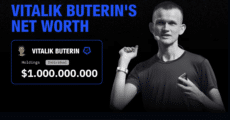
Mild Austerity Hits Ethereum Foundation, Here Is What Will Change
The Ethereum Foundation begins mild austerity, shifts funds to open tech, privacy tools, and long-term support for ETH users worldwide.


Russian-Canadian programmer and writer primarily known as a co-founder of Ethereum.
Vitalik Buterin is one of the most influential figures in the history of cryptocurrency and blockchain technology. He co-founded Ethereum and transformed how digital assets, decentralized applications, and smart contracts are conceived, built, and used worldwide.
From his early work writing for Bitcoin Magazine to the launch of a platform that enabled an entirely new generation of decentralized systems, Buterin’s vision has helped define the modern crypto economy.
Born on January 31, 1994, in Kolomna, Russia, Vitalik Buterin moved with his family to Canada at the age of six. From an early age, his academic performance was exceptional. He especially loved mathematics, programming, and economics. His first significant encounter with cryptocurrency came in 2011, when his father introduced him to BTC $76 770 24h volatility: 2.4% Market cap: $1.53 T Vol. 24h: $59.39 B . This sparked his deep dive into blockchain and its possibilities.
Buterin’s foundational role in crypto began before ETH $2 274 24h volatility: 7.2% Market cap: $274.89 B Vol. 24h: $43.15 B was even conceived. He was a co-founder and prominent writer for Bitcoin Magazine, one of the first major publications focused on Bitcoin and blockchain topics. This role allowed him to explore and refine early ideas about decentralization and digital currency, establishing him as a notable voice in the nascent crypto community.
In late 2013, at just 19 years old, Buterin published the Ethereum whitepaper. He proposed a new kind of blockchain that would extend Bitcoin’s functionality. His crucial insight was that blockchain could do more than record financial transfers. It could host programmable contracts and decentralized applications (dApps). This vision laid the foundation for Ethereum, a platform designed not just as currency but as a global decentralized computing system.
Ethereum launched in 2015 after a successful initial coin offering (ICO) that raised funding in Bitcoin. Within just a few years, it grew into the world’s second-largest blockchain network by market capitalization and ecosystem size, powering thousands of dApps, DeFi protocols, NFT platforms, decentralized autonomous organizations (DAOs), and more.
It’s worth emphasizing that although Ethereum today functions as a decentralized protocol governed by a vast community of developers and stakeholders, Buterin remains its most visible and influential figure — often described as the de facto “face” of Ethereum.
From the beginning, Buterin’s involvement with Ethereum wasn’t limited to its inception; he has been involved deeply in its ongoing evolution and upgrades — both technical and philosophical.
One of the most consequential phases in Ethereum’s history was the transition from Proof-of-Work (PoW) to Proof-of-Stake (PoS). The shift was aimed at dramatically reducing the network’s energy consumption, improving security, and enhancing scalability. This upgrade, widely known in the community as The Merge, fundamentally altered the economics and structure of Ethereum’s consensus layer.
Buterin has been central to both the conceptual framework and public explanation of this shift. His technical contributions include ongoing research into consensus mechanisms, protocols, and scaling strategies that underpin Ethereum’s multi-phase upgrade roadmap.
Buterin and the broader developer community continue to tackle Ethereum’s long-term challenges: scalability, decentralization, and sustainability. He frequently engages in public technical discussions about concepts such as rollups, sharding, and stateless clients, all aimed at making Ethereum more efficient and accessible for developers and users alike.
Always glad to see when people appreciate the protocol changes that add hard invariants, improving protocol security and future adaptability
2021: EIP-2929 + 3529 (SLOAD gas cost increase, refunds nerfed)
2024: SELFDESTRUCT nerf (Dencun)
2025: 16,777,216 gas per tx limitAll of… https://t.co/tPdaKZRCEm
— vitalik.eth (@VitalikButerin) December 3, 2025
Buterin’s thought leadership often extends to proposals that reshape how nodes operate. One of his ideas is to lower the hardware requirements for running a node, which could broaden participation in Ethereum’s validation ecosystem.
Vitalik’s influence has seeded or inspired numerous other developments across the crypto landscape:
Buterin is also a prolific public speaker and writer. He regularly shares insights on crypto’s ethical, economic, and social implications. Moreover, he advocates decentralization, user empowerment, and responsible innovation.
As Ethereum’s co-founder, Buterin has held significant ETH holdings. This has contributed substantially to his elevated status among crypto pioneers.
At various points, estimates have placed his holdings in the hundreds of thousands of ETH, making him one of the most notable stakeholders in the network he helped create. As of 2025 end, according to Arkham Intelligence, Buterin held around $1 billion worth of crypto.

Vitalik Buterin’s crypto holdings in 2025 | Source: Arkham Intelligence
Yet Buterin’s public persona is rarely that of a conventional investor focused solely on profit maximization. Instead, he has used his resources for philanthropy on a significant scale. Among his most notable contributions are:
This blend of investment and altruism underscores a philosophy in which technological progress and social good are intertwined — a narrative that distinguishes Buterin from many other crypto billionaires and founders.
Vitalik’s influence extends into broader cultural and policy spheres. He is often featured at major blockchain conferences and participates in debates about crypto regulation. Moreover, he contributes to academic and technical discussions that shape industry standards and expectations.
His approach tends to emphasize long-term thinking, technical rigor, and a commitment to a decentralized future, even as Ethereum faces competition and evolving market dynamics. Observers frequently cite his role in guiding philosophical debates about crypto’s purpose and potential as one of his most significant ongoing contributions.
Today, Ethereum stands as the backbone of a vast segment of the crypto economy: from DeFi to NFTs and beyond. While any single individual no longer controls the network, Buterin’s ideas continue to influence its development, governance, and ideological direction.
As the ecosystem evolves, his legacy is reflected in how crypto innovators think about digital trust, governance, and communities. Whether through technical proposals to improve consensus mechanisms, public advocacy for open systems, or the ecosystem growth catalyzed by Ethereum’s success, Buterin’s imprint on crypto is enduring.
Ethereum Foundation
Jan 31st, 1994
Russian-Canadian
University of Basel, Doctorate from the Faculty of Business and Economics - 30 November 2018
Ethereum - Co-Founder
OmiseGo - Advisor
Bitcoin Magazine - Co-Founder

The Ethereum Foundation begins mild austerity, shifts funds to open tech, privacy tools, and long-term support for ETH users worldwide.

Ethereum’s early supporters are repurposing $220 million in idle funds from the infamous 2016 DAO hack to establish a comprehensive security fund for the network.

Ethereum co-founder Vitalik Buterin plans to move to decentralized social networking in 2026.

The Intelligent Privacy Pool lets users prove their funds are compliant without revealing transaction details, based on research co-authored by Vitalik Buterin.

The Ethereum co-founder argues that ZK-EVMs and decentralized storage now allow builders to create permanent tools that replace restrictive corporate software.